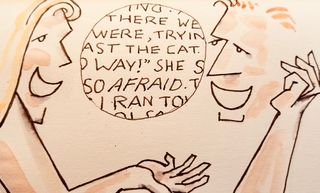Oxytocin
Are We the Stories We Tell?
Some neurologists and philosophers think so, but it begs a key question.
Posted September 8, 2019 Reviewed by Gary Drevitch

I teach creative writing at the college level and in my first class of the term I tend to rant about why writing, which is of course based on story-telling, is important.
"Humans are not the tool-making ape," I tell my somewhat bemused students. "Before the ape invented a tool it had to tell itself a story about how the tool might work, such as, 'What if I pick up this twig and stick it in that mound where termites hide? The termites will get stuck on the wood. So. . . when I pull it out, the twig will be full of succulent bugs. And then I will eat them. . . and my fellow apes will be jealous!'" The basic structure of language (subject, verb, object) and narrative (conflict, action, resolution) are contained in that visualization.
(Of course, a few other species display rudimentary tool-making behavior, with vital implications for non-human consciousness; but as far as our serial tool-making ancestors are concerned, the point remains the same.)
The paleontological record shows the evolution of human consciousness was inextricably entwined with ritual story-telling within cooperative social groups. Look at the frescoes in the Lascaux caves, which are generally accepted as telling a tale of the hunt and associated rites.
Every human group of which there is any record imagines its origin in story form, from the Gaia myth of the ancient Greeks to the Abrahamic religions' fable of Adam, Eve, and the snake.
The logic seems clear: Humans are, first and foremost, the story-telling ape.
Recent neurological research backs up the primordial role of story-telling in how we think and act. Watching stories with a distinct dramatic arc—i.e., the conflict-action-resolution sequence mentioned above—releases oxytocin in the human brain. Oxytocin is a hormone that both increases our attention and involves us, empathetically, in other humans.
Attention and empathy: What qualities could be more useful for the development of a cooperative social animal?
Stories are also linked to memory. Generally speaking we recall our past when the hippocampus directs us to cached memories.
Introspection provides examples of this process. Remembering feels to me like soaking in a bath of images and sense impressions that coalesce around a story of what happened in a particular place to specific people. I remember my brother, not through some cataloguing of his CV, but through the story of when we drove together from Massachusetts to Washington, and ran out of gas near a strip club in Maryland, and what happened after that.
A 1969 Stanford study suggested that words embedded in stories are remembered six to seven times better than the same words read randomly. Another study, by UC researchers, demonstrated that narrative texts, such as a short story, are read twice as fast, and remembered twice as accurately, as the same data offered in expository form (ie., a dictionary entry).
Psychologists and philosophers have taken the link between humans and their stories a step further. Paul Ricoeur posited human identity as split between idem, the self as a continuity of remembered actions, and ipse, or actions we imagine taking in the future. The link between the two is a story we tell; a story that contains our identity.
For Wilhelm Schapp, there is no difference between a human and the tales a human tells of him-, her-, or X-self. The entire existence of humans and their objective world, Schaap wrote, consists of stories they tell themselves, either stories of what happened in the past, or stories of what they plan for the future.
It's a theory that sounds highly defensible to me, but it poses the question: If we are the stories we tell of ourselves, must it not then follow that to change our selves, and our lives, we need only make up a different story? And what would a refugee losing their family to thirst and bombing raids in a besieged Syrian city think of that hypothesis? Theodor Adorno once wrote, "To write poetry after Auschwitz is barbaric." He was making a more complex point, but is this in part what he was getting at?
My next post will address that issue.


